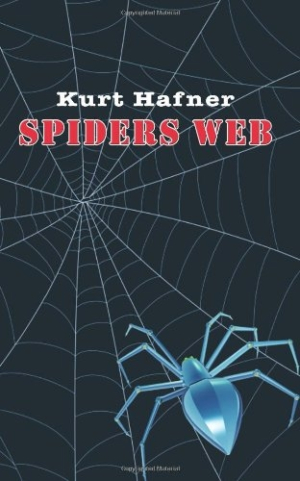Spiders Web
Kurt Hafner’s debut novel, Spiders Web, weaves together strands of international intrigue and a wide-ranging group of characters into a slow-burning thriller. At the center of this imbroglio are Rolf and Sabine Brenner’s successful electronics company, the United Kingdom-based Brenner Limited and its American branch. Unbeknownst to the Brenners, cultured organized crime boss Julian Tarrant and his associates have plans for the company. Professor Duncan Campbell and his daughter Fiona, as well as Fiona’s boyfriend, Michael Howard, a Brenner employee, also find themselves in danger. Soon, suspicious police become aware of a sinister plot. Everyone attempts to turn the situation to their advantage before matters implode.
Rolf, Sabine, Duncan, Fiona, Michael, and Julian all represent rounded players with detailed backstories. The subtle hints of a dastardly scheme unfolding across the globe makes the reader tingle with anticipation. After an accident harms several characters, anyone expecting Hafner to start connecting plot threads will be disappointed. Instead, the sense of foreboding increases, but the audience still doesn’t know what the mystery is about. At one-third of the way through the book, one knows that Julian has wormed his way into the company and poisoned his fiancee, but the reader has no inkling of how these actions connect to the black-suited people who may or may not be monitoring Rolf, Sabine, Fiona, and Michael. Instead of providing readers with tantalizing tidbits, the author adds on characters and locales until it becomes confusing to distinguish among them. The author’s failure to bring the rising suspense to a conclusion in a timely manner runs the risk of boring readers. As the characters pile up, readers may wonder who is important as they lose sight of Rolf, Sabine, Duncan, Fiona, Michael, and Julian.
The author reports events from the viewpoint of a disinterested observer. For example, he recounts a vicious brawl in the distancing language of third person and uses dialogue whenever characters exchange pleasantries with their servants. Wine, cars, and watches are described with the kind of detail usually reserved for characters’ personalities. The quality of the grammar and punctuation steadily worsens as the novel progresses, severely impeding the reader’s understanding of the story. Even the title, Spiders Web, lacks the needed apostrophe to show that the arachnid possesses its web. The ingredients exist here for a globe-trotting thriller in the vein of James Bond, but Hafner never really ties together all of the pieces. He plans this book as a foundation for future novels. One hopes he can work out the kinks and make the following installments live up to their potential. Those who can tolerate a large cast of characters and constant foreshadowing will appreciate Spiders Web.
Reviewed by
Jill Allen
Disclosure: This article is not an endorsement, but a review. The publisher of this book provided free copies of the book and paid a small fee to have their book reviewed by a professional reviewer. Foreword Reviews and Clarion Reviews make no guarantee that the publisher will receive a positive review. Foreword Magazine, Inc. is disclosing this in accordance with the Federal Trade Commission’s 16 CFR, Part 255.


